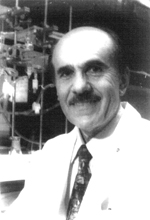Louis Ignarro
Louis J. Ignarro | |
|---|---|
 | |
| Born | May 31, 1941 |
| Nationality | American |
| Known for | nitric oxide |
| Awards | Nobel Prize in Physiology or Medicine (1998) |
| Scientific career | |
| Fields | pharmacology |
| Institutions | UCLA School of Medicine, King Saud University |
Louis J. Ignarro (born May 31, 1941) is an American pharmacologist. He was corecipient of the 1998 Nobel Prize in Physiology or Medicine with Robert F. Furchgott and Ferid Murad for demonstrating the signaling properties of nitric oxide.

He is currently professor of pharmacology at the UCLA School of Medicine's department of molecular and medical pharmacology in Los Angeles, which he joined in 1985. Before relocating to California, he was a professor of pharmacology at Tulane University School of Medicine, New Orleans, for 12 years. Ignarro has also previously worked as a staff scientist, research department, for the pharmaceutical division of CIBA-GEIGY Corporation in New York.
Ignarro has published numerous articles on his research. He received the Basic Research Prize of the American Heart Association in 1998, in recognition of his outstanding contributions to the advancement of cardiovascular science. That same year, he was inducted into the National Academy of Sciences and the following year, into the American Academy of Arts and Sciences.
He is the founder of the Nitric Oxide Society, and founder and editor-in-chief of Nitric Oxide Biology and Chemistry.[1] Ignarro holds a B.S. in pharmacy, Columbia University, 1962, and a Ph.D. in pharmacology, University of Minnesota, School of Medicine, 1966. He also received a postdoctoral fellowship in chemical pharmacology from National Institutes of Health in 1968. He is a member of the scientific committee of Nicox, a French pharmaceutical company, a member of the Board of Directors of Antibe Therapeutics[2], a Canadian drug discovery company, a member of the Board of Directors of Operation USA, a non-profit organization, and a member of the Nutritional Advisory Board for Herbalife, a for-profit nutrition and weight-loss company.
Awards and Recognitions
- Awarded a Nobel Prize in 1998.
- By 1998 Ignarro was the winner of 11 consecutive Golden Apples, the award UCLA medical students give to the year's best teacher.[3]
- 2008 American Heart Association Distinguished Scientist.[4]
Early life
Born of Italian immigrants, Ignarro grew up near New York City, and had a predilection for science from an early age, which led to a bachelor's degree in pharmacy from Columbia University and a Ph.D. in pharmacology from the University of Minnesota. His university studies also concentrated in chemistry, enzymology and cardiovascular physiology, and resulted in several published papers. His work continued at the NIH in the fields he'd studied, collaborating with many other scientists to discover regulatory mechanisms of the cardiovascular system that would lead to his most famous work.
Nitric oxide
Nitric oxide, NO, not to be confused with nitrous oxide, N2O (a gas used in anesthesia), is colorless, odorless gas that is an important signaling molecule in the body of mammals, including humans, but is toxic at high doses. It is important in the chemical industry and is also a toxic air pollutant produced by cigarette smoke, automobile engines, and power plants. In 1994, the respected journal Science declared nitric oxide as its "molecule of the year" for the exciting discoveries surrounding its physiological signaling roles. Dr. Ignarro has been prominent in advocating alternative medical uses including the treatment of heart disease, shock, cancer, impotence, and pulmonary hypertension. NO is now known to play a key role in many biological functions including inflammation, blood flow regulation, cell growth, smooth muscle relaxation, and preserving memory. Each year, thousands of research papers are written about the molecule.[1] Appropriate levels of NO production are important in protecting organs from damage.
Herbalife relationship
Ignarro worked with Herbalife to develop Niteworks, a dietary supplement designed to boost the body’s own production of nitric oxide, and later became a member of the company’s Scientific Advisory Board. Ignarro endorsed this product in exchange for a royalty agreement reported to have earned his consulting firm over $1 million in the first 12 months.
Ignarro also promoted Niteworks' ingredients in the Proceedings of the National Academy of Sciences, where, as a member of the National Academy of Sciences, he can submit papers without review, and furthermore without disclosing his financial interest to the publication. After Ignarro's ties to Herbalife were revealed, the journal issued a correction to the article, citing Ignarro's undisclosed "conflict of interest."[5]
Publications
- NO More Heart Disease: How Nitric Oxide Can Prevent - Even Reverse - Heart Disease and Strokes. New York: St. Martin's Press (2005). ISBN 0312335822.
- Health Is Wealth: 10 Power Nutrients That Increase Your Odds Of Living To 100. Health Value Publications (2009). ASIN: B002RS4388.
See also
Notes
- ^ a b "Louis J. Ignarro Biography (1941-)". Free Health Encyclopedia. Retrieved 2008-09-28.
- ^ Antibe Therapeutics
- ^ "Louis J. Ignarro". UCLA. Retrieved 2008-09-28.
- ^ "Distinguished Scientist 2008". AHA. Retrieved 2008-11-17.
- ^ Talk:Louis_Ignarro&oldid=249076145#Herbalife_Controversey
References
- UCLA Louis J. Ignarro, Medicine (1998)
- "Nobel Prize Winner Didn't Disclose Herbalife Contract" Bloomberg News report
- Washington Post article "Nitric Oxide Now -- Ask Me How: Some Find Nobel Laureate's Alliance With Supplement Marketer Hard to Swallow", Washington Post, October 7, 2003
- Louis Ignarro bio, Herbalife.com, cited March 17, 2008
External links
- Louis Ignarro's Official Homepage
- Nobel Prize Autobiography
- Herbalife Niteworks
- NO More Heart Disease
- Health Is Wealth
